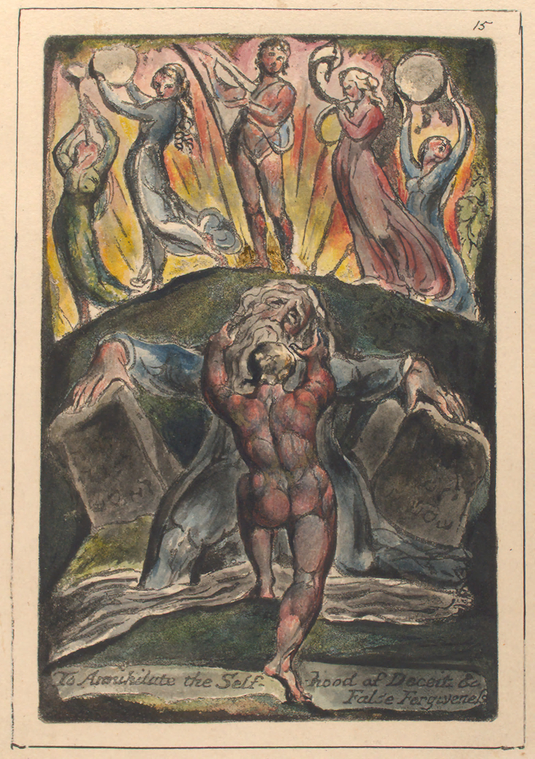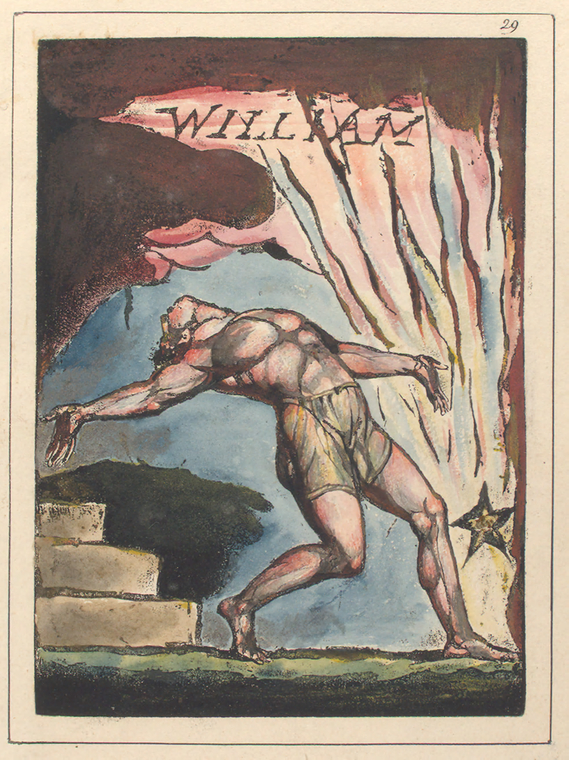1) Ololon seeking Milton who appears in Blake's gardenMilton, Plate 37 [41], (E 137) "The Virgin answerd. Knowest thou of Milton who descended Driven from Eternity; him I seek! terrified at my Act In Great Eternity which thou knowest! I come him to seek So Ololon utterd in words distinct the anxious thought Mild was the voice, but more distinct than any earthly That Miltons Shadow heard & condensing all his Fibres Into a strength impregnable of majesty & beauty infinite I saw he was the Covering Cherub & within him Satan And Raha[b], in an outside which is fallacious! within Beyond the outline of Identity, in the Selfhood deadly And he appeard the Wicker Man of Scandinavia in whom Jerusalems children consume in flames among the Stars Descending down into my Garden, a Human Wonder of God Reaching from heaven to earth a Cloud & Human Form I beheld Milton with astonishment & in him beheld The Monstrous Churches of Beulah, the Gods of Ulro dark Twelve monstrous dishumanizd terrors Synagogues of Satan. A Double Twelve & Thrice Nine: such their divisions."
"For Ololon step'd into the Polypus within the Mundane Shell
They could not step into Vegetable Worlds without becoming
The enemies of Humanity except in a Female Form
And as One Female, Ololon and all its mighty Hosts
Appear'd: a Virgin of twelve years nor time nor space was
To the perception of the Virgin Ololon but as the
Flash of lightning but more quick the Virgin in my Garden
Before my Cottage stood for the Satanic Space is delusion
For when Los joind with me he took me in his firy whirlwind
My Vegetated portion was hurried from Lambeths shades
He set me down in Felphams Vale & prepard a beautiful
Cottage for me that in three years I might write all these Visions
To display Natures cruel holiness: the deceits of Natural Religion[.]
Walking in my Cottage Garden, sudden I beheld
The Virgin Ololon & address'd her as a Daughter of Beulah[:]
Virgin of Providence fear not to enter into my Cottage
What is thy message to thy friend: What am I now to do
Is it again to plunge into deeper affliction? behold me
Ready to obey, but pity thou my Shadow of Delight
Enter my Cottage, comfort her, for she is sick with fatigue" 3) Milton's Shadow enters
Milton, Plate 37 [41], (E 137)
"The Virgin answerd. Knowest thou of Milton who descended
Driven from Eternity; him I seek! terrified at my Act
In Great Eternity which thou knowest! I come him to seek
So Ololon utterd in words distinct the anxious thought
Mild was the voice, but more distinct than any earthly
That Miltons Shadow heard & condensing all his Fibres
Into a strength impregnable of majesty & beauty infinite
I saw he was the Covering Cherub & within him Satan
And Rahab, in an outside which is fallacious! within
Beyond the outline of Identity, in the Selfhood deadly
And he appeard the Wicker Man of Scandinavia in whom
Jerusalems children consume in flames among the Stars
Descending down into my Garden, a Human Wonder of God
Reaching from heaven to earth a Cloud & Human Form
I beheld Milton with astonishment & in him beheld
The Monstrous Churches of Beulah, the Gods of Ulro dark
Twelve monstrous dishumanizd terrors Synagogues of Satan.
A Double Twelve & Thrice Nine: such their divisions."Milton, Plate 39 [44],(E 140)"So Milton
Labourd in Chasms of the Mundane Shell, tho here before
My Cottage midst the Starry Seven, where the Virgin Ololon
Stood trembling in the Porch: loud Satan thunderd on the stormy Sea
Circling Albions Cliffs in which the Four-fold World resides
Tho seen in fallacy outside: a fallacy of Satans Churches"
4) Milton hears Ololon's account, and calls for annihilation of selfhood Milton, Plate 40 [46], (E 141)
"Before Ololon Milton stood & percievd the Eternal Form
Of that mild Vision; wondrous were their acts by me unknown
Except remotely; and I heard Ololon say to Milton
I see thee strive upon the Brooks of Arnon. there a dread
And awful Man I see, oercoverd with the mantle of years.
I behold Los & Urizen. I behold Orc & Tharmas;
The Four Zoa's of Albion & thy Spirit with them striving
In Self annihilation giving thy life to thy enemies
Are those who contemn Religion & seek to annihilate it
Become in their Femin[in]e portions the causes & promoters
Of these Religions, how is this thing? this Newtonian Phantasm
This Voltaire & Rousseau: this Hume & Gibbon & Bolingbroke
This Natural Religion! this impossible absurdity
Is Ololon the cause of this? O where shall I hide my face
These tears fall for the little-ones: the Children of Jerusalem
Lest they be annihilated in thy annihilation.
No sooner she had spoke but Rahab Babylon appeard
Eastward upon the Paved work across Europe & Asia
Glorious as the midday Sun in Satans bosom glowing:
A Female hidden in a Male, Religion hidden in War
Namd Moral Virtue; cruel two-fold Monster shining bright
A Dragon red & hidden Harlot which John in Patmos saw
And all beneath the Nations innumerable of Ulro
Appeard, the Seven Kingdoms of Canaan & Five Baalim
Of Philistea. into Twelve divided, calld after the Names
Of Israel: as they are in Eden. Mountain. River & Plain
City & sandy Desart intermingled beyond mortal ken
But turning toward Ololon in terrible majesty Milton
Replied. Obey thou the Words of the Inspired Man
All that can be annihilated must be annihilated
That the Children of Jerusalem may be saved from slavery
There is a Negation, & there is a Contrary
The Negation must be destroyd to redeem the Contraries
The Negation is the Spectre; the Reasoning Power in Man
This is a false Body: an Incrustation over my Immortal
Spirit; a Selfhood, which must be put off & annihilated alway
To cleanse the Face of my Spirit by Self-examination."
"These are the destroyers of Jerusalem, these are the murderers
Of Jesus, who deny the Faith & mock at Eternal Life:
Who pretend to Poetry that they may destroy Imagination;
By imitation of Natures Images drawn from Remembrance
These are the Sexual Garments, the Abomination of Desolation
Hiding the Human lineaments as with an Ark & Curtains
Which Jesus rent: & now shall wholly purge away with Fire
Till Generation is swallowd up in Regeneration.
Then trembled the Virgin Ololon & replyd in clouds of despair
Is this our Feminine Portion the Six-fold Miltonic Female
Terribly this Portion trembles before thee O awful Man
Altho' our Human Power can sustain the severe contentions
Of Friendship, our Sexual cannot: but flies into the Ulro.
Hence arose all our terrors in Eternity! & now remembrance
Returns upon us! are we Contraries O Milton, Thou & I
O Immortal! how were we led to War the Wars of Death
Is this the Void Outside of Existence, which if enterd into
PLATE 42 [49]
Becomes a Womb? & is this the Death Couch of Albion
Thou goest to Eternal Death & all must go with thee"6) Sixfold virgin divides, flees to Milton's shadow, Ololon descends to Felpham's valeMilton, Plate 42 [49] (E 143)
"Becomes a Womb? & is this the Death Couch of Albion
Thou goest to Eternal Death & all must go with thee
So saying, the Virgin divided Six-fold & with a shriek
Dolorous that ran thro all Creation a Double Six-fold Wonder!
Away from Ololon she divided & fled into the depths
Of Miltons Shadow as a Dove upon the stormy Sea.
Then as a Moony Ark Ololon descended to Felphams Vale
In clouds of blood, in streams of gore, with dreadful thunderings
Into the Fires of Intellect that rejoic'd in Felphams Vale
Around the Starry Eight: with one accord the Starry Eight became
One Man Jesus the Saviour. wonderful! round his limbs
The Clouds of Ololon folded as a Garment dipped in blood
Written within & without in woven letters: & the Writing
Is the Divine Revelation in the Litteral expression:
A Garment of War, I heard it namd the Woof of Six Thousand Years
And I beheld the Twenty-four Cities of Albion
Arise upon their Thrones to Judge the Nations of the Earth
And the Immortal Four in whom the Twenty-four appear Four-fold
Arose around Albions body: Jesus wept & walked forth
From Felphams Vale clothed in Clouds of blood, to enter into
Albions Bosom, the bosom of death & the Four surrounded him
In the Column of Fire in Felphams Vale; then to their mouths the Four
Applied their Four Trumpets & them sounded to the Four winds
Terror struck in the Vale I stood at that immortal sound
My bones trembled. I fell outstretchd upon the path
A moment, & my Soul returnd into its mortal state
To Resurrection & Judgment in the Vegetable Body
And my sweet Shadow of Delight stood trembling by my side
Immediately the Lark mounted with a loud trill from Felphams Vale
And the Wild Thyme from Wimbletons green & impurpled Hills
And Los & Enitharmon rose over the Hills of Surrey
Their clouds roll over London with a south wind, soft Oothoon
Pants in the Vales of Lambeth weeping oer her Human Harvest
Los listens to the Cry of the Poor Man: his Cloud
Over London in volume terrific, low bended in anger.
Rintrah & Palamabron view the Human Harvest beneath
Their Wine-presses & Barns stand open; the Ovens are prepar'd
The Waggons ready: terrific Lions & Tygers sport & play
All Animals upon the Earth, are prepard in all their strength"
Milton, Plate 43 [50] (E 144)
"To go forth to the Great Harvest & Vintage of the Nations
Finis"


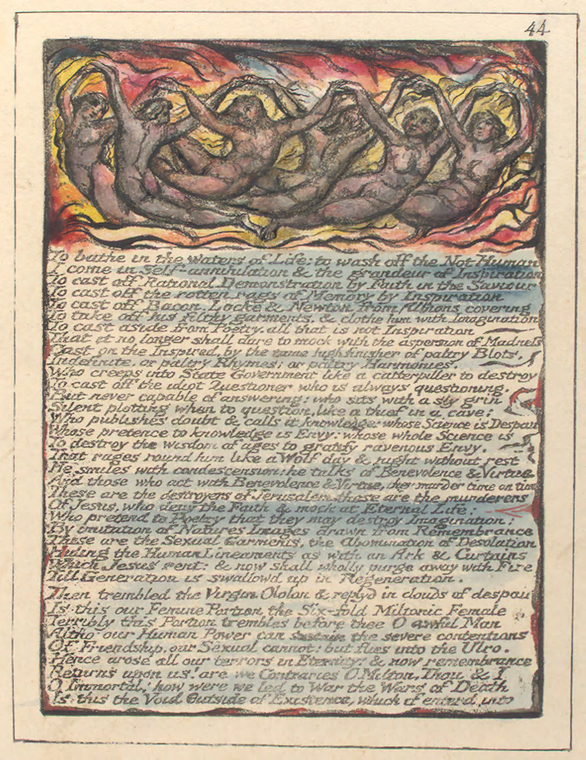
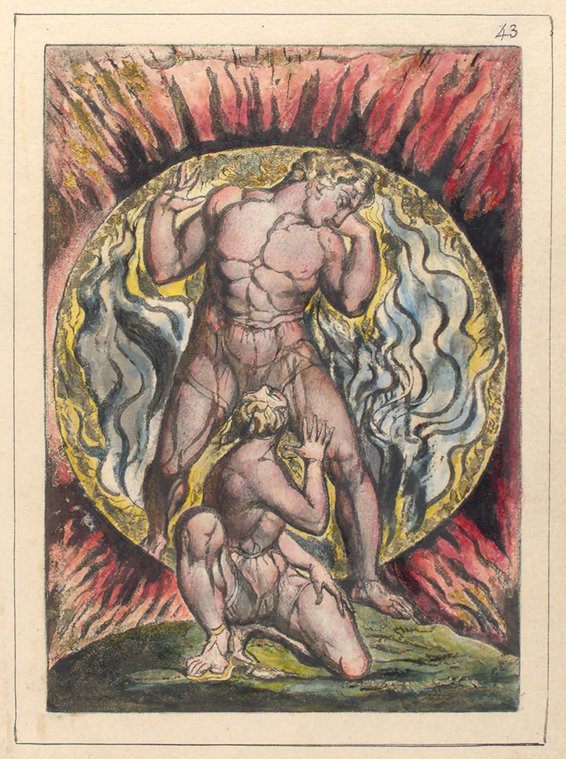
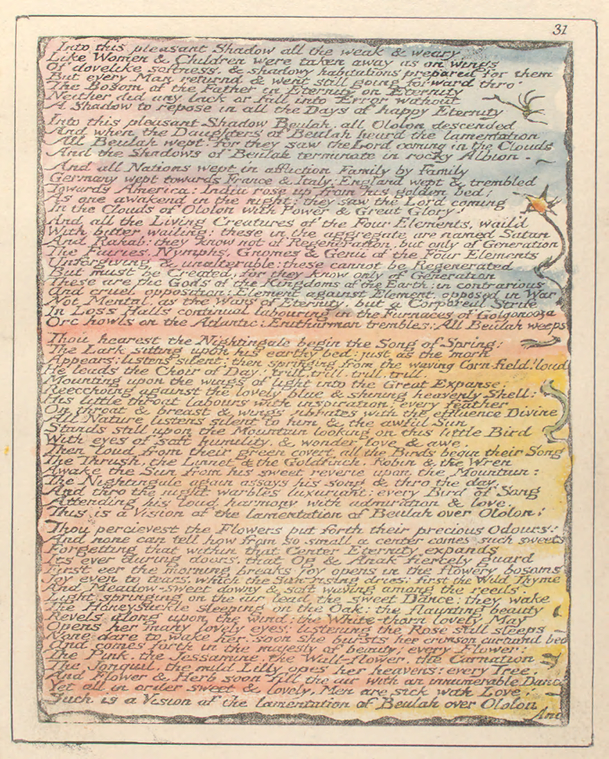
.jpg)
